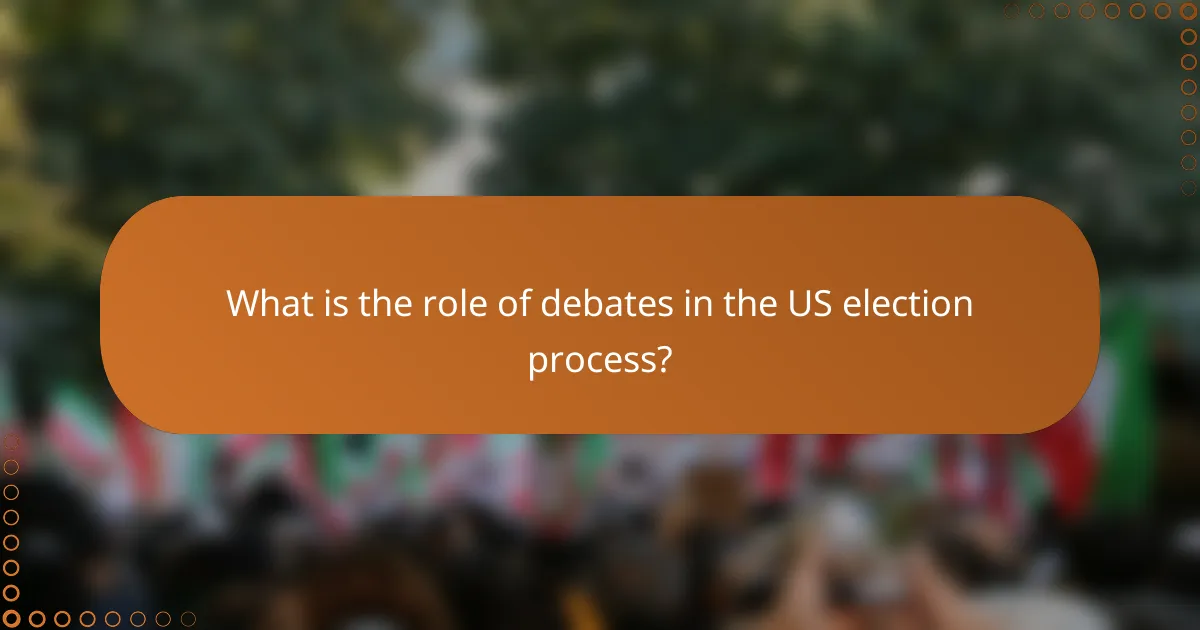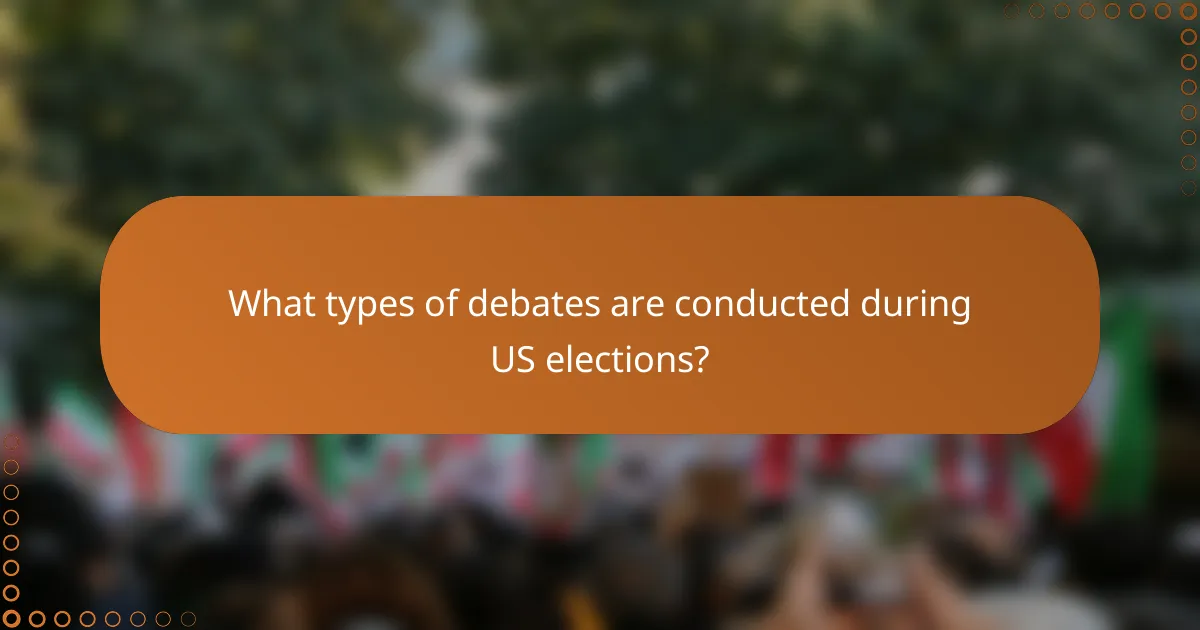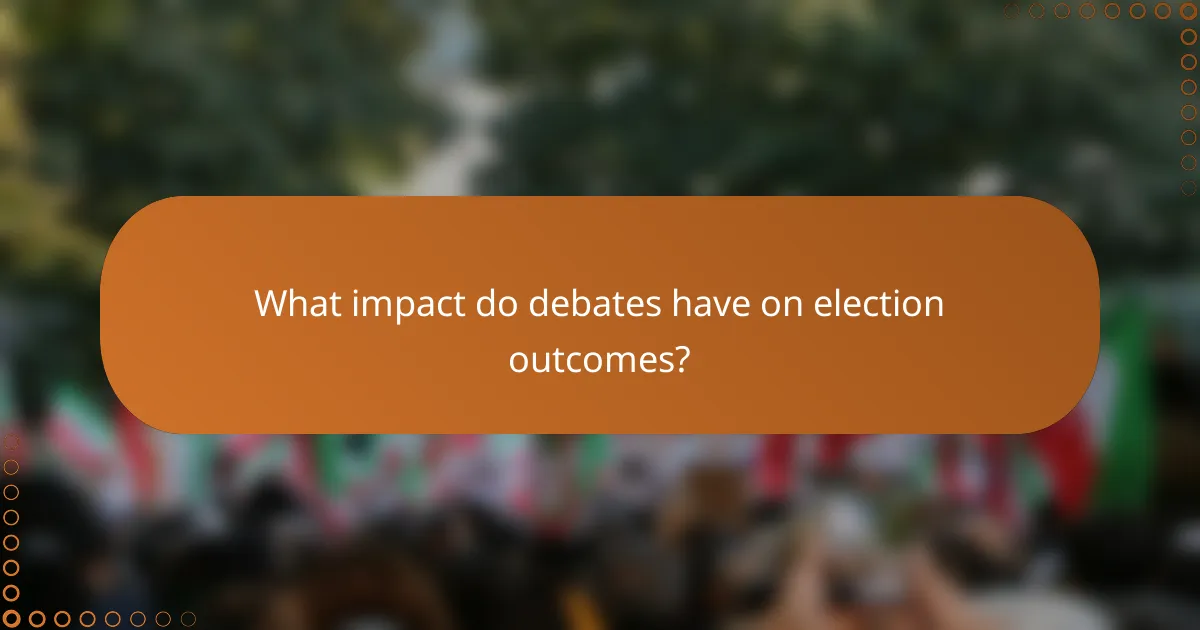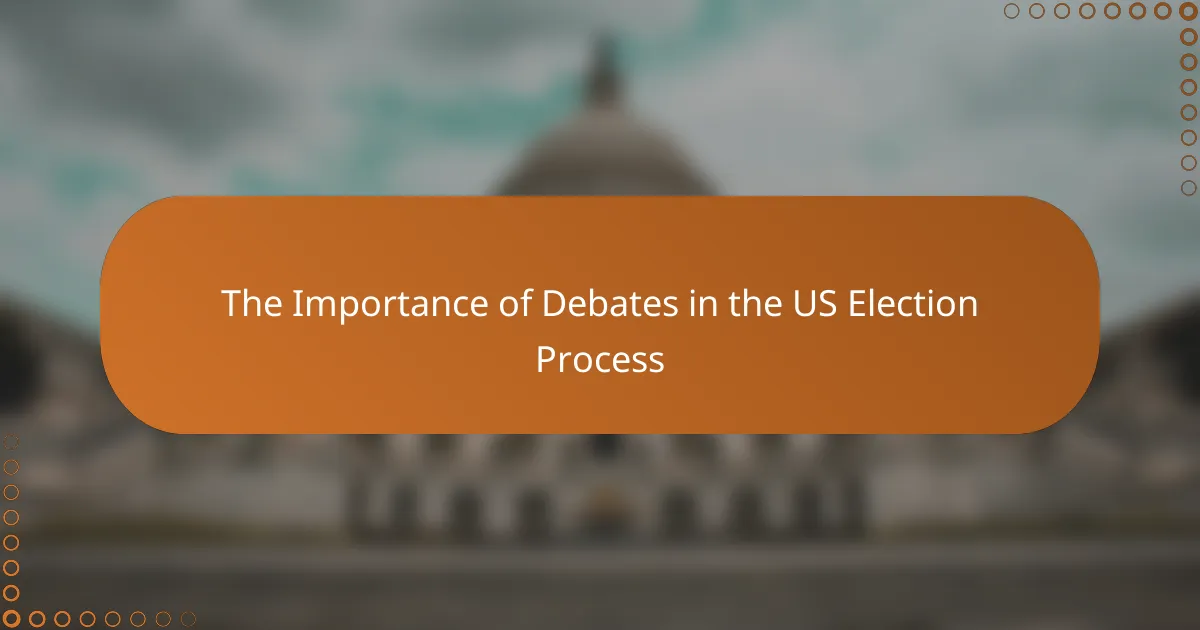Debates are a fundamental component of the US election process, serving as a platform for candidates to present their policies and engage with opponents while enhancing transparency for voters. Various types of debates, including primary debates, general election debates, and town hall debates, facilitate direct comparisons of candidates’ views on key issues. Historical evidence demonstrates that debates significantly influence voter perceptions and can alter election outcomes, as seen in notable instances like the 1960 Kennedy-Nixon debate and the 1984 Reagan debate. Research indicates that a substantial percentage of voters may change their opinions based on debate performances, underscoring the critical role debates play in shaping public opinion and informing electoral decisions.

What is the role of debates in the US election process?
Debates play a crucial role in the US election process by providing a platform for candidates to present their policies and engage with opponents. They allow voters to compare candidates’ views directly. Debates also enhance transparency by addressing key issues in a public forum. Historically, debates have significantly influenced voter perceptions and election outcomes. For example, the 1960 Kennedy-Nixon debate showcased the impact of televised debates on public opinion. Additionally, debates encourage candidates to articulate their positions clearly, which aids informed voting. Overall, debates are essential for democratic engagement and informed decision-making in elections.
How do debates influence voter perceptions?
Debates significantly influence voter perceptions by shaping opinions and highlighting candidate differences. They serve as a platform for candidates to present their policies and respond to opponents. Voters often rely on debates to gauge candidates’ competence and charisma. According to a Pew Research study, 66% of viewers felt debates helped them make informed decisions. Additionally, debates can sway undecided voters by clarifying issues. The exposure candidates receive can also enhance their visibility and credibility. Overall, debates play a crucial role in the electoral process by directly impacting voter attitudes and choices.
What factors contribute to a candidate’s performance in debates?
Candidates’ performance in debates is influenced by several key factors. Preparation is critical; candidates who thoroughly understand their topics perform better. Communication skills also play a significant role. Clear and persuasive speech can engage the audience effectively. Body language is another important aspect. Confident posture and eye contact can enhance credibility.
Knowledge of opponents’ positions allows candidates to counter arguments effectively. Additionally, the ability to think on their feet is crucial. Candidates must respond to unexpected questions or comments during debates. Lastly, public perception and media coverage can impact candidates’ performance. Positive media portrayal can boost confidence and audience reception.
How do debates shape public opinion during elections?
Debates shape public opinion during elections by providing a platform for candidates to communicate their policies. They allow voters to compare candidates directly on key issues. This exposure can influence voter perceptions and preferences. Research shows that debates can sway undecided voters significantly. According to a 2020 Pew Research study, 49% of voters reported that debates helped them decide whom to support. Debates also highlight candidates’ strengths and weaknesses in real-time. This dynamic interaction can create memorable moments that resonate with the public. As a result, debates can ultimately impact election outcomes.
Why are debates considered essential in the election process?
Debates are essential in the election process because they provide a platform for candidates to present their views. They allow voters to compare candidates directly on key issues. Debates can influence public opinion and voter decisions. Research shows that 70% of voters believe debates help them make informed choices. Candidates can clarify their positions and respond to criticisms in real-time. This interaction enhances transparency and accountability in the electoral process. Debates also stimulate media coverage, increasing public engagement in elections. Overall, they are a critical tool for democratic participation.
What historical significance do debates hold in US elections?
Debates hold significant historical importance in US elections as they shape public perception and influence voter decisions. The first presidential debate in 1960 between John F. Kennedy and Richard Nixon marked a pivotal moment in political communication. Kennedy’s televised performance is credited with enhancing his image and contributing to his electoral victory. Debates provide candidates a platform to articulate their policies and engage with opponents directly. They also serve as a critical moment for fact-checking claims made by candidates. Historically, debates have become more structured and formalized, reflecting changes in media and technology. The impact of debates on voter turnout and engagement has been documented in various studies. For example, a 2016 study by the Pew Research Center found that 67% of voters considered debates important in their decision-making process. Thus, debates have evolved into a crucial element of the electoral landscape in the United States.
How have debates evolved over the years in the US election landscape?
Debates in the US election landscape have significantly evolved over the years. Initially, debates were informal and primarily local events. The first recorded debate took place in 1858 between Abraham Lincoln and Stephen A. Douglas. This debate was focused on key issues like slavery and showcased the candidates’ oratory skills.
In the 1960s, televised debates began to reshape the political landscape. The first televised debate between John F. Kennedy and Richard Nixon in 1960 highlighted the importance of appearance and media presence. This debate attracted around 70 million viewers and set a precedent for future elections.
Over the years, debates have become more structured and regulated. The Commission on Presidential Debates was established in 1987 to oversee the format and rules. This organization has standardized the debate process, ensuring equal time for candidates and a focus on major issues.
In recent years, social media has transformed the way debates are perceived and discussed. Candidates now engage with audiences in real-time, allowing for immediate feedback and interaction. This has led to a more dynamic and fast-paced debate environment.
Overall, debates have transitioned from informal gatherings to highly organized events with significant media coverage. They now play a crucial role in shaping public opinion and influencing election outcomes.

What types of debates are conducted during US elections?
The types of debates conducted during US elections include primary debates, general election debates, and town hall debates. Primary debates occur among candidates within the same political party to secure nominations. General election debates feature candidates from opposing parties competing for the presidency. Town hall debates involve candidates answering questions from the public in a more informal setting. Each type serves to inform voters and clarify candidates’ positions on various issues. Historical data shows that debates significantly influence public opinion and voter turnout. For example, the 1960 Kennedy-Nixon debates are often credited with shaping the perception of television’s role in politics.
How do primary debates differ from general election debates?
Primary debates differ from general election debates in their focus and participants. In primary debates, candidates compete against others within the same political party. The goal is to secure the party’s nomination for the general election. These debates often highlight differences in policy and ideology among candidates.
In contrast, general election debates feature candidates from opposing parties. The aim is to persuade a broad electorate to gain votes in the final election. General election debates typically address a wider range of issues that concern the general public. They also emphasize the candidates’ ability to appeal to undecided voters.
Research indicates that primary debates can be more contentious due to the competitive nature among party members. General election debates, however, often focus on presenting a more polished image to attract a diverse voter base.
What formats are commonly used in US election debates?
Common formats used in US election debates include the traditional debate format, town hall meetings, and panel discussions. The traditional debate format typically features candidates answering questions from moderators. This format allows for direct comparison of candidates’ positions. Town hall meetings involve candidates responding to questions from the audience. This format encourages interaction and engagement with voters. Panel discussions include multiple experts or journalists asking questions, providing diverse perspectives. Each format aims to facilitate dialogue and inform voters about candidates’ policies and views.
How do town hall debates engage voters differently?
Town hall debates engage voters differently by fostering direct interaction between candidates and the electorate. These formats allow voters to ask questions and express concerns in real time. This immediacy creates a more personal connection to the candidates. Voters often feel more empowered to participate in discussions. Research indicates that town hall settings can increase voter turnout by up to 15%. This is due to the perceived accessibility of candidates. Additionally, town hall debates often address local issues more directly. This relevance can enhance voter interest and engagement in the electoral process.
What are the key components of a successful debate?
A successful debate includes clear structure, strong arguments, effective rebuttals, and audience engagement. Clear structure helps participants follow the flow of the debate. Strong arguments are supported by evidence and logical reasoning. Effective rebuttals address opposing viewpoints directly and respectfully. Audience engagement ensures that the debate resonates with viewers, making it more impactful. These components contribute to a debate’s overall effectiveness and persuasiveness.
How important is debate preparation for candidates?
Debate preparation is crucial for candidates. It enhances their ability to articulate policies clearly. Candidates who prepare are more likely to respond effectively to questions. They can anticipate opponents’ arguments and counter them. Research shows that well-prepared candidates perform better in debates. For example, a study by the University of Southern California found that preparation improves candidates’ confidence and delivery. This ultimately influences public perception and voter decisions. Therefore, thorough debate preparation significantly impacts a candidate’s success.
What role does moderator selection play in debate effectiveness?
Moderator selection is crucial for debate effectiveness. A well-chosen moderator can facilitate balanced discussions. They ensure all candidates have equal speaking time. This promotes fairness and reduces bias. An effective moderator also poses insightful questions. This encourages deeper engagement on key issues. Research shows that debates with skilled moderators yield higher viewer satisfaction. According to a study by the Pew Research Center, debates with effective moderators increase audience trust in the process. Thus, moderator selection significantly impacts the overall quality and effectiveness of debates.

What impact do debates have on election outcomes?
Debates significantly influence election outcomes. They provide candidates an opportunity to present their policies and engage with opponents. Voter perceptions often shift based on debate performances. For instance, the 1984 presidential debate showcased Ronald Reagan’s effective communication, boosting his approval ratings. Research indicates that debates can sway undecided voters. According to a study by the Pew Research Center, 27% of voters reported changing their minds after watching debates in the 2020 election cycle. Overall, debates play a critical role in shaping public opinion and electoral decisions.
How can a debate performance change the trajectory of a campaign?
A debate performance can significantly alter the trajectory of a campaign by influencing public perception and voter sentiment. Strong performances can enhance a candidate’s credibility and appeal. Conversely, poor performances may lead to negative media coverage and decreased support. Historical examples include the 1984 presidential debate, where Ronald Reagan’s confident demeanor helped solidify his lead. In contrast, the 2000 debates highlighted Al Gore’s perceived lack of warmth, affecting his campaign negatively. Polls often show shifts in voter intention following debates, indicating their impact on campaign momentum. Effective debate strategies can also sway undecided voters, making debates crucial in competitive elections.
What evidence exists linking debate performances to polling shifts?
Debate performances can significantly influence polling shifts. Research indicates that candidates often see immediate changes in voter support following debates. A notable example is the 2000 presidential debate between George W. Bush and Al Gore. Polls showed a marked increase in support for Gore after his strong performance. Similarly, the 2016 election saw a shift in favor of Donald Trump after his debate performances.
According to a study by the Pew Research Center, 63% of debate watchers reported being influenced by what they saw. This suggests that debates can sway undecided voters. Furthermore, historical data from past elections consistently shows that candidates who perform well in debates often experience a boost in their poll numbers shortly afterward.
These findings underscore the importance of debate performances in shaping public opinion during election cycles.
How do debates affect undecided voters’ choices?
Debates significantly influence undecided voters’ choices by providing a platform for candidates to present their policies. They allow voters to compare candidates side by side in real-time. This exposure can clarify voters’ preferences and priorities. According to a study by the Pew Research Center, 43% of undecided voters reported that debates helped them make their final decision. Debates often highlight candidates’ strengths and weaknesses, impacting perceptions. Voters tend to remember key moments or statements from debates, which can sway opinions. The emotional and rhetorical skills displayed during debates can also resonate with undecided voters, leading to a choice.
What strategies can candidates employ to excel in debates?
Candidates can excel in debates by employing several effective strategies. First, thorough preparation is essential. Candidates should research their opponents’ positions and anticipate counterarguments. This helps in formulating strong responses. Practicing speaking skills boosts confidence and clarity. Candidates should rehearse answers to common questions and practice their delivery.
Utilizing clear and concise language is crucial. Candidates must communicate their points effectively to be understood by the audience. Engaging with the audience can also enhance their performance. Candidates should make eye contact and use body language to convey confidence.
Staying calm under pressure is vital. Candidates need to manage their emotions, especially when challenged. They should focus on the issues rather than personal attacks. This approach resonates better with viewers.
Finally, candidates should highlight their unique policies. Presenting clear, actionable plans distinguishes them from opponents. This strategy can leave a lasting impression on voters.
How can candidates effectively convey their message during a debate?
Candidates can effectively convey their message during a debate by using clear and concise language. They should articulate their main points without jargon or ambiguity. Engaging with the audience is crucial; candidates should maintain eye contact and use appropriate body language. Active listening is also important; candidates must respond thoughtfully to opponents’ arguments. Utilizing examples and anecdotes can help illustrate their points more vividly. Practicing their delivery can enhance confidence and clarity. Research shows that candidates who prepare extensively tend to perform better in debates. This preparation allows them to anticipate questions and counterarguments effectively.
What common pitfalls should candidates avoid in debates?
Candidates should avoid personal attacks during debates. Personal attacks can alienate voters and detract from key issues. Instead, candidates should focus on policy and facts. Another pitfall is failing to prepare adequately. Lack of preparation can lead to misinformation and weak responses. Candidates should also avoid speaking in jargon. Using complex language can confuse voters. Additionally, candidates should not ignore time limits. Going over time can frustrate the audience and moderators. Lastly, candidates should avoid being overly defensive. A defensive stance can come off as untrustworthy. These pitfalls can significantly impact a candidate’s debate performance and public perception.
How can voters leverage debates to make informed decisions?
Voters can leverage debates to make informed decisions by actively engaging with the candidates’ positions. Debates provide a platform for candidates to express their policies and viewpoints. Voters can compare these positions against their own values and needs. Observing candidates’ responses under pressure reveals their critical thinking and problem-solving abilities. Additionally, debates often highlight differences between candidates, clarifying their stances on key issues. Fact-checking statements made during debates can further inform voters about the accuracy of candidates’ claims. Research indicates that 70% of voters find debates helpful in understanding candidates’ positions (Pew Research Center, 2020). This engagement ultimately empowers voters to make choices aligned with their beliefs.
What key questions should voters consider while watching debates?
Voters should consider several key questions while watching debates. First, they should ask, “What are the candidates’ positions on major issues?” This helps voters understand where each candidate stands on topics that matter to them. Next, voters should consider, “How do candidates respond to challenging questions?” This reveals their ability to think on their feet and handle pressure. Another important question is, “Do candidates provide evidence to support their claims?” Fact-based arguments are crucial for informed decision-making. Voters should also evaluate, “How do candidates interact with each other?” Their demeanor can indicate their temperament and leadership style. Lastly, voters should reflect on, “What are the candidates’ plans for the future?” Clear, actionable plans are essential for assessing viability. These questions guide voters in making informed choices during elections.
How can voters analyze candidates’ responses critically during debates?
Voters can analyze candidates’ responses critically during debates by evaluating their clarity, consistency, and factual accuracy. Candidates should express their points clearly, avoiding jargon and ambiguity. Voters should note if candidates provide specific examples to support their claims. Consistency in a candidate’s responses over time is crucial; voters should compare statements made in previous debates or interviews. Voters must fact-check claims made during debates against reliable sources. They should also observe candidates’ body language and tone, as these can indicate confidence or evasiveness. Engaging with non-partisan analysis after the debate can provide additional insights into candidates’ performances. According to a Pew Research Center study, 62% of voters believe fact-checking is essential in understanding candidates’ positions.
The main entity of this article is the role of debates in the US election process. The article examines how debates serve as a critical platform for candidates to present their policies, engage with opponents, and influence voter perceptions. It highlights the historical significance of debates, their evolution over time, and the various formats used during elections. Key factors affecting candidates’ performances and the impact of debates on undecided voters and election outcomes are also discussed, emphasizing the importance of preparation and effective communication in shaping public opinion.
